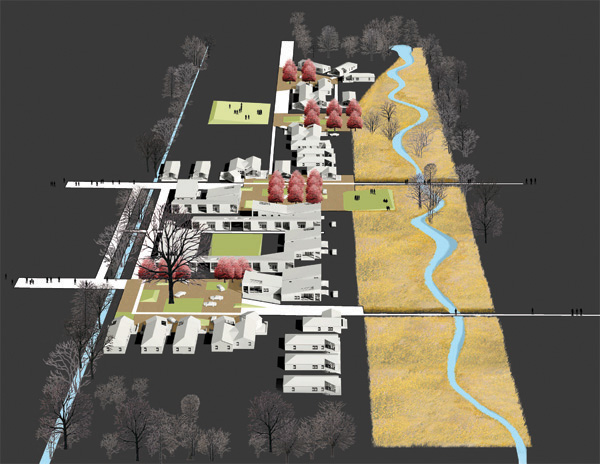FAYETTEVILLE, Ark. — The University of Arkansas Community Design Center, an outreach program of the School of Architecture, has won three national awards for a sustainable neighborhood that they designed for the Washington Co. chapter of Habitat for Humanity. Porchscapes has won a 2009 American Institute of Architects Honor Award for Regional and Urban Design; a Progressive Architecture Award in the 56th Annual Progressive Architecture Awards program, sponsored by Architect magazine; and a 2008-09 ACSA/AIA Housing Design Education Award sponsored by the Association of Collegiate Schools of Architecture and the American Institute of Architects. These latest awards bring recognition for the project to a total of seven regional and national awards. The Progressive Architecture Awards and the American Institute of Architects Honor Awards are considered the top awards programs in planning and design in the nation.
“We’re glad to get the recognition, but this project goes beyond awards and compelling ideas,” said Stephen Luoni, director of the Community Design Center. “Our goal is to streamline the use of low impact development technologies for future green neighborhood development.”
The project, which the design center developed in partnership with Professor Marty Matlock of the Ecological Engineering Group in the University of Arkansas Division of Agriculture, the university’s department of biological and agricultural engineering, the city of Fayetteville and McClelland Consulting Engineers, eliminates curbs, gutters, catch basins, and detention ponds in favor of a “shared street” — on track to be the first of its kind in the United States — that promotes community, calms traffic and soaks up stormwater like a sponge.
“One of our objectives is to demonstrate the multiple benefits of shared streets, rubber sidewalks, and rainwater gardens that are illegal under most current ordinances, except in the most ambitious green communities. A handbook under development by our team will outline the municipal codes and engineering practices necessary to make low impact development a 'by-right’ development standard,” Luoni said.
Located on Huntsville Road, adjacent to transitional housing for Seven Hills Homeless Center, the 10-acre parcel will include 43 units to be built for approximately $60 per square foot plus infrastructure costs. A wet meadow, rainwater gardens, bioswales, and pervious parking and street surfaces will absorb and treat stormwater on site, a key goal in lowimpact development. With no curbs or gutters needed, infrastructure costs are cut by half, Luoni said.
The U.S. Green Building Council has selected the Fayetteville Habitat neighborhood as a pilot project for LEED-Neighborhood Development certification. The Fayetteville project is one of 60 with priority for certification and special focus group study by the U.S. Green Building Council. A $23,000 grant by the University of Arkansas Women’s Giving Circle, an $8,000 grant from the Kellogg Foundation and a $464,000 grant by the Arkansas Natural Resources Commission that is funded by the Environmental Protection Agency have supported the design phase. The project is currently in the engineering phase. Habitat for Humanity plans to launch a fundraising campaign for the project this spring.
“I think it’s awesome that they are getting these awards, and it can’t hurt us with the fundraising,” said Wendi Jones, director of the Washington Co. chapter of Habitat for Humanity. In addition to raising the estimated $2.2 million needed for infrastructure, Jones hopes to establish a long-range plan that will fund all of the houses.
“The neighborhood will not only be environmentally friendly, but will be housing people who need homes,” she said.
